A quick review of China's 2024 global interactions through 5 lenses
来源:Xinhua 2024-12-29 17:54
*China, unlike some Western countries, is not seeking to form treaty alliances, but building a network of global partnerships featuring equality, openness and cooperation.
*In recent years, endeavors to align the BRI with development strategies of other countries have become a unique way for China to bolster its practical cooperation with the wider world.
*As Xi emphasized during his talks with Blinken, "We live in an interdependent world and rise and fall together. With their interests deeply intertwined, all countries need to build maximum consensus for win-win and all-win outcomes."
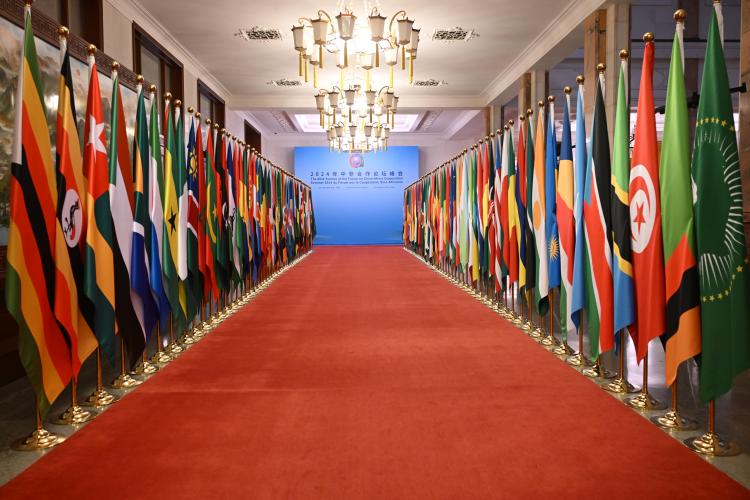
This photo taken on Sept. 5, 2024 shows an interior view of the Great Hall of the People before the opening of the 2024 Summit of the Forum on China-Africa Cooperation (FOCAC) in Beijing, capital of China. (Xinhua/Jin Liangkuai)
by Xinhua Writers Liu Bowei, Li Jiacong
BEIJING, Dec. 28 (Xinhua) -- While the passing year saw a rapidly evolving international landscape featuring changes and chaos, China has been determined to join its global partners to defend peace and boost stability and development.
To better understand China's global interactions in this eventful year, some insights can be offered through the following five lenses.
UPGRADES OF TIES
"Welcome home!" Prime Minister Viktor Orban greeted Chinese President Xi Jinping and his wife, Peng Liyuan, at the airport when they arrived in Budapest for a state visit to Hungary in May, reflecting the special nature of the China-Hungary partnership.
This year marks the 75th anniversary of China-Hungary diplomatic relations. During the visit, the two leaders jointly announced the elevation of bilateral ties to an all-weather comprehensive strategic partnership for the new era.
Hungary is not the only country whose relationship with China was upgraded in 2024. In the past year, Tajikistan, Serbia and the Maldives, among others, have also elevated their ties with China.
China, unlike some Western countries, is not seeking to form treaty alliances, but building a network of global partnerships featuring equality, openness and cooperation.
"We should make more friends while abiding by the principle of non-alignment and build a global network of partnership," Xi said 10 years ago. He has since brought up the idea on multiple international occasions.
During the Forum on China-Africa Cooperation Beijing Summit in September, China established or upgraded strategic partnerships with 30 African countries, thus becoming a strategic partner of all the 53 African countries with whom it has diplomatic relations.
Alliance is the old international relations mindset of "finding enemies," while partnerships are the new vision of "making friends," said Su Changhe, dean of the School of International Relations and Public Affairs at Fudan University.
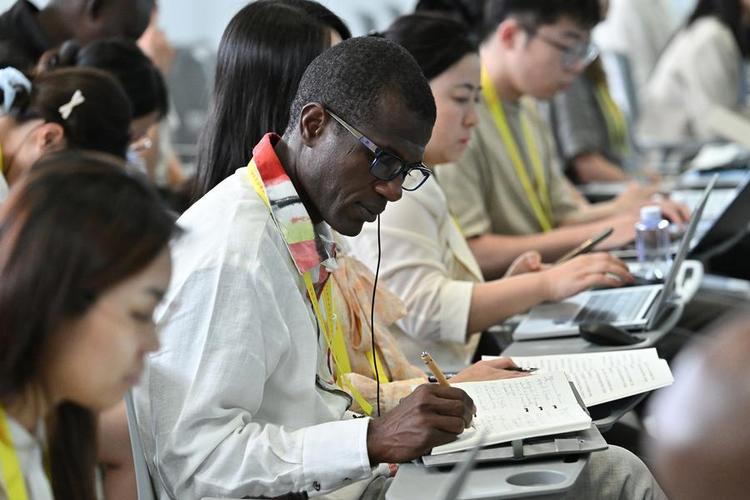
Journalists attend a press briefing of the 2024 Summit of the Forum on China-Africa Cooperation (FOCAC) in Beijing, capital of China, Sept. 2, 2024. (Xinhua/Li Xin)
ALIGNMENT OF DEVELOPMENT STRATEGIES
During a state visit to Brazil in November, Xi and Brazilian President Luiz Inacio Lula da Silva jointly announced the decision to synergize the Belt and Road Initiative (BRI) and Brazil's development strategies, such as the New Industry Brazil and the Growth Acceleration Program.
Rui Costa, chief of staff of the Brazilian presidency, said Brazil's development strategies are highly compatible with the BRI, voicing confidence that the strategic alignment "will further unleash Brazil's economic vitality."
In recent years, endeavors to align the BRI with development strategies of other countries have become a unique way for China to bolster its practical cooperation with the wider world.
Since 2013, multiple countries have pledged to synergize their development strategies with the BRI, including Kazakhstan's Bright Path economic policy, Mongolia's Steppe Road Program, Saudi Arabia's "Vision 2030," Russia's Eurasian Economic Union, and the African Union's Agenda 2063.
Instead of introducing a unilateral vision or starting a new one, the BRI focuses on aligning with existing national development plans and global initiatives, leveraging complementary strengths to generate shared benefits, said Thong Mengdavid, a lecturer at the Institute for International Studies and Public Policy of the Royal University of Phnom Penh.
This strategy of aligning frameworks and complementing capabilities prioritizes inclusivity, mutual respect and practical cooperation, which have been pivotal to the BRI's wide acceptance and growth, he added.
The results speak for themselves. Take Hungary's alignment with the BRI through its "Eastern Opening" policy for example. In 2015, Hungary became the first European country to join the BRI, paving the way for connectivity projects like the Budapest-Belgrade railway, which is expected to be fully operational by 2025. By then, the railway will serve as a critical link connecting Eastern and Central Europe, significantly enhancing the efficiency of logistics and passenger transportation in Hungary, Serbia and the neighboring regions.
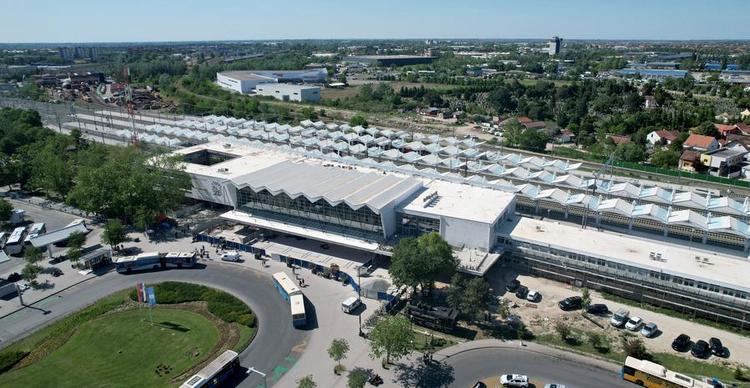
An aerial drone photo shows the Novi Sad railway station in Novi Sad, Serbia, April 29, 2024. The Budapest-Belgrade railway is one of the flagship projects of China's Belt and Road Initiative. (Photo by Liu Yuxin/Xinhua)
DWELLERS OF THE SAME PLANET
Planet Earth is only this big, and humanity is faced with so many common challenges, Xi said while meeting with U.S. Secretary of State Antony Blinken in Beijing in April, noting that dwellers of the same planet should help each other.
Xi has advocated the concept of shared responsibility as dwellers of the same planet on many occasions this year, including at the conference marking the 70th anniversary of the Five Principles of Peaceful Coexistence and during his state visit to Brazil.
Rooted in the Chinese saying "Passengers in the same boat should help each other," the concept is not only a faithful reflection of today's increasingly interdependent world, but also an up-to-date interpretation of Xi's vision of building a community with a shared future for mankind.
This concept is also reflected in China's efforts to address international conflicts. Not long ago, "Friends of Peace," a platform initiated by China, Brazil and other like-minded Global South countries on the Ukraine crisis, was established at the United Nations, aiming to accumulate conditions and create an atmosphere for a ceasefire, an end to hostilities and the resumption of peace talks.
Balazs Andras Orban, political director of Hungary's prime minister, applauded China's effort in the Ukraine crisis, saying the world should not head toward war and division.
As Xi emphasized during his talks with Blinken, "We live in an interdependent world and rise and fall together. With their interests deeply intertwined, all countries need to build maximum consensus for win-win and all-win outcomes."
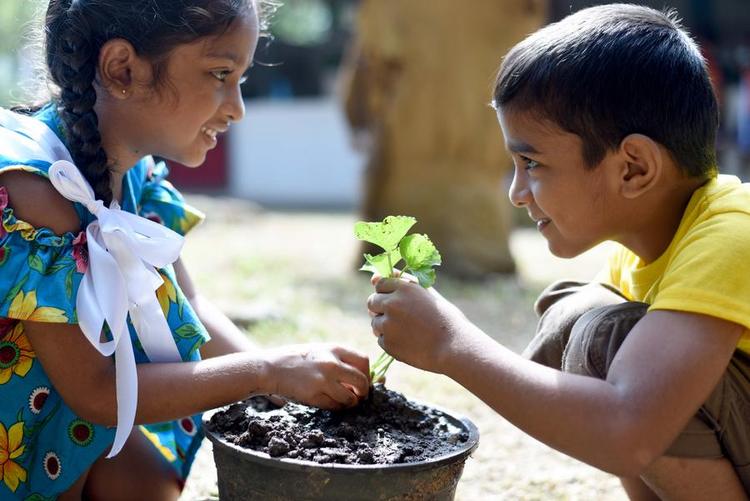
Children plant a sapling on World Soil Day in Gampaha, Sri Lanka on Dec. 5, 2024. (Photo by Gayan Sameera/Xinhua)
GLOBAL SOUTH SOLIDARITY
"Global South" was listed as one of "the top 10 global buzzwords" earlier this month in an event that released the most popular Chinese characters and phrases of 2024, a vivid testament to the rapid rise of the developing world.
Meeting foreign leaders either in Beijing or on trips abroad this year, Xi has frequently highlighted the importance of bringing Global South countries together. When addressing the "BRICS Plus" leaders' dialogue this year in Russia's Kazan, he mentioned the buzzword 13 times, voicing strong support for Global South countries' development and aspirations.
The collective rise of the Global South is a distinctive feature of the great transformation across the world. Since the end of the Cold War, emerging economies have greatly increased their global influence, with the Global South now representing over 40 percent of the world economy.
The Global South emerges for development and prospers through development. China has always been a backbone force in promoting the development of the Global South. Just as Xi said at the G20 summit in Rio de Janeiro, China will always be a member of the Global South, a reliable long-term partner of fellow developing countries, and a doer and go-getter working for the cause of global development.
True to its principle, China is the first to explicitly support the African Union's membership in the G20. Over the years, China has provided development assistance to over 160 countries, collaborated with over 100 countries and international organizations, and set up a Global Development and South-South Cooperation Fund, which has supported more than 150 projects.
"China is clearly demonstrating its commitment to the fight against poverty and its real support for the development of countries, especially those in the Global South," said Eduardo Regalado, a senior researcher at the International Policy Research Center of Cuba.
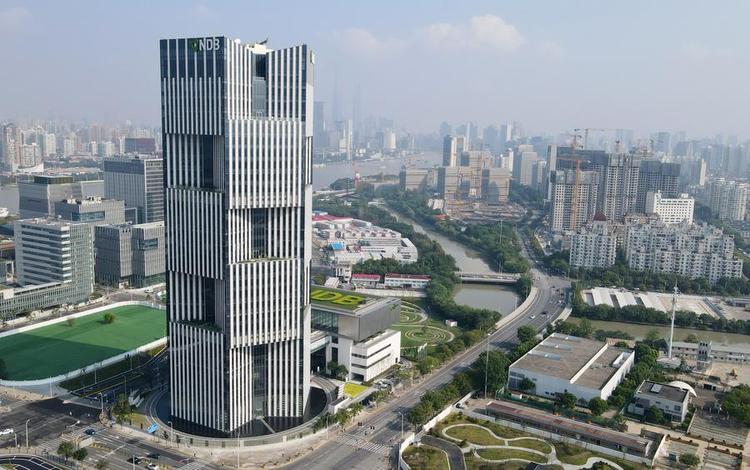
Aerial photo taken on Sept. 28, 2021 shows the headquarters building of the New Development Bank (NDB) in Shanghai, east China. (Xinhua/Fang Zhe)
MUTUAL LEARNING AMONG CIVILIZATIONS
An exhibition was held at Peru's Inca Museum in November. Visitors could see artifacts from China's Sanxingdui and Jinsha ruins, including a golden sun and immortal bird ornament, as well as Inca pottery and gold artifacts. These precious cultural relics present both the similarities and diversities of the world's two ancient and impactful civilizations.
During his talks with Peruvian President Dina Boluarte in Lima in November, Xi urged the two sides to shoulder the responsibility of the times of mutual learning among civilizations, advocate strengthening international dialogue among civilizations, and explore the establishment of a global network for dialogue and cooperation among civilizations.
Besides the joint exhibition in Peru, China has, over the past year, actively deepened cooperation in culture, art, education and heritage preservation, highlighting its commitment to fostering mutual learning among civilizations.
The China-France Year of Culture and Tourism features various events, including an exhibition on the theme of "The Forbidden City and the Palace of Versailles," which allowed visitors to immerse themselves in a China-France cultural exchange of 17th-18th century pieces.
Also in 2024, events were launched to mark the Kazakhstan Tourism Year, the China-Russia Year of Culture, and the China-ASEAN Year of People-to-people Exchanges, a strong testament to China's commitment to cultural exchanges.
Alok Kumar Pathak, associate fellow at the BRICS Institute India in Delhi, gave a thumbs-up to China's efforts in promoting the exchange of diverse civilizations, saying that "encouraging exchanges and learning among cultures is important for mutual progress."
As Xi once pointed out, "Diversity of civilization is the innate quality of the world. We should be advocates for exchanges among civilizations."





